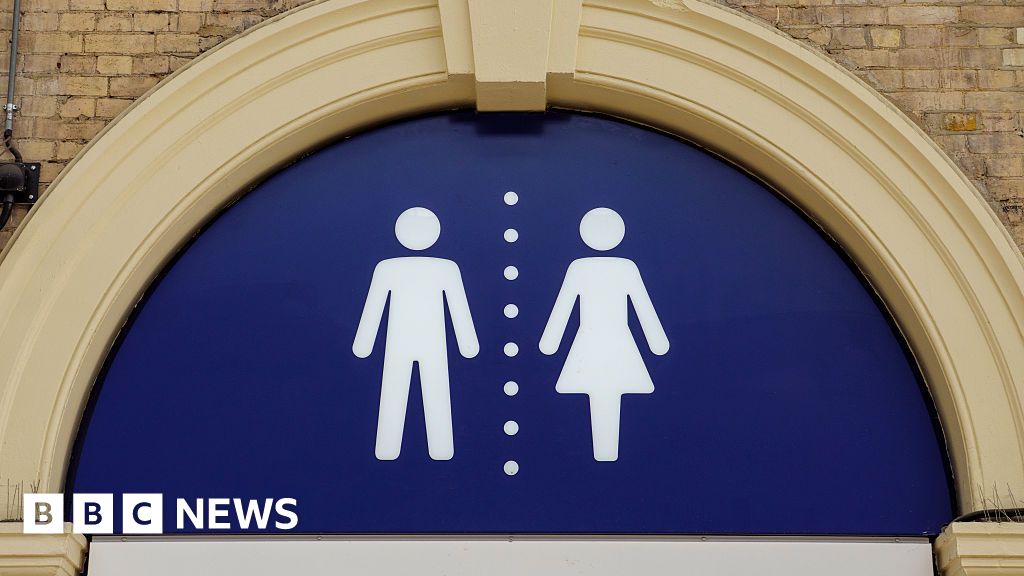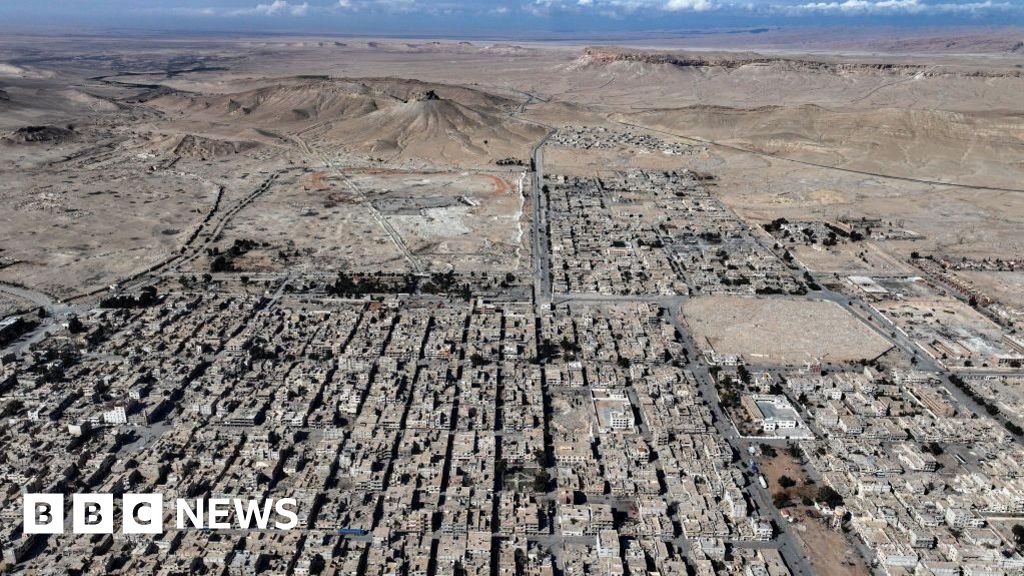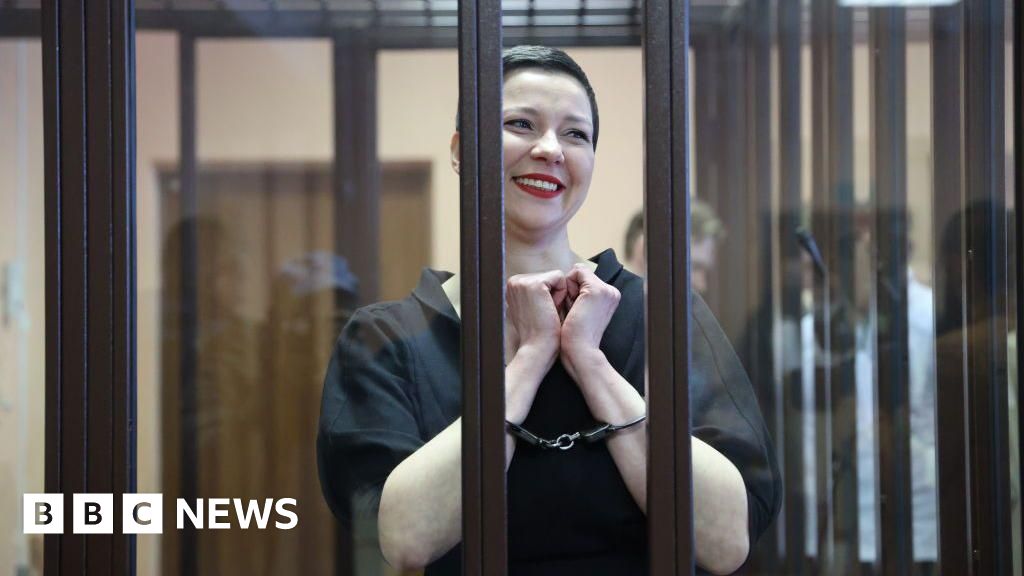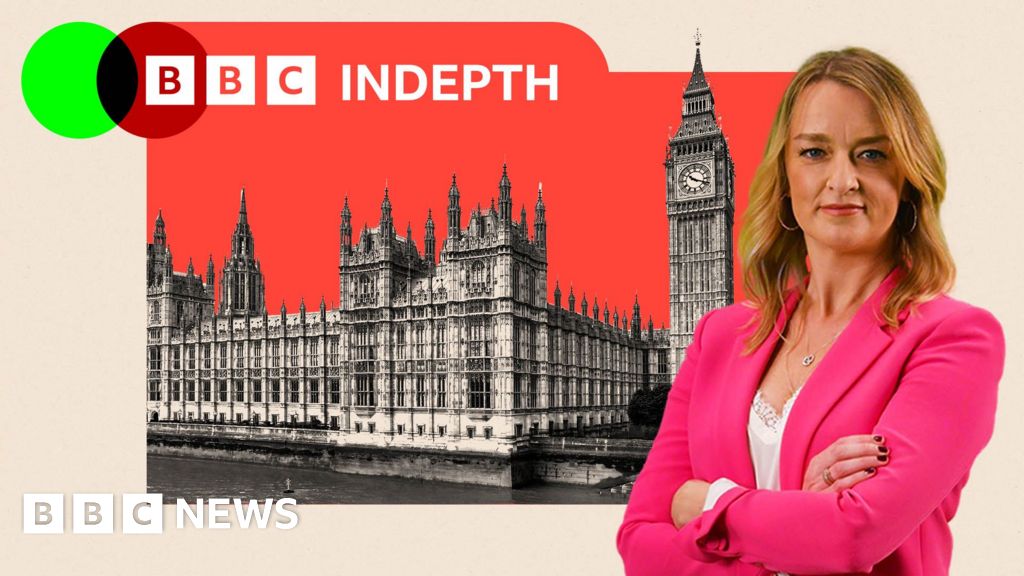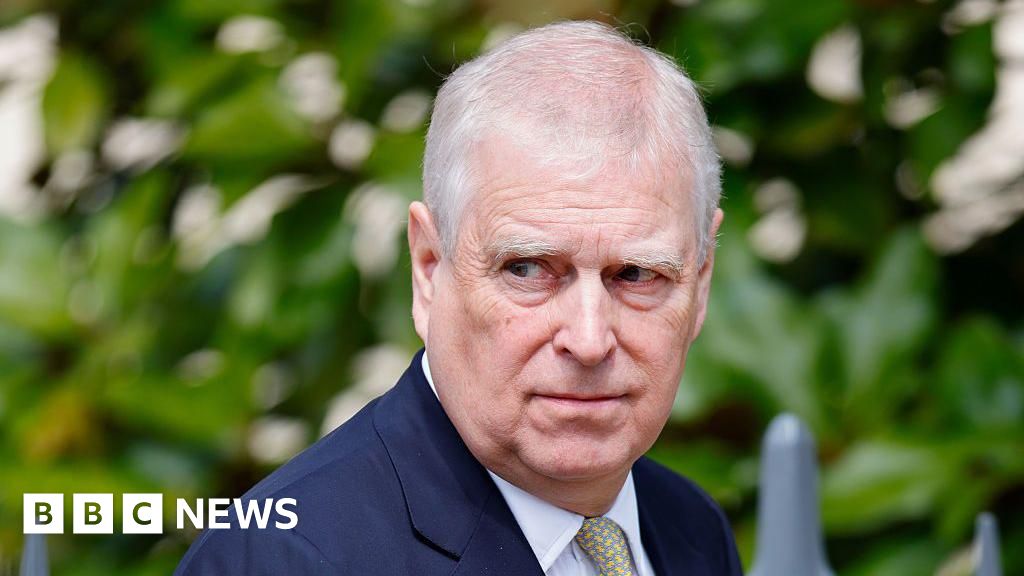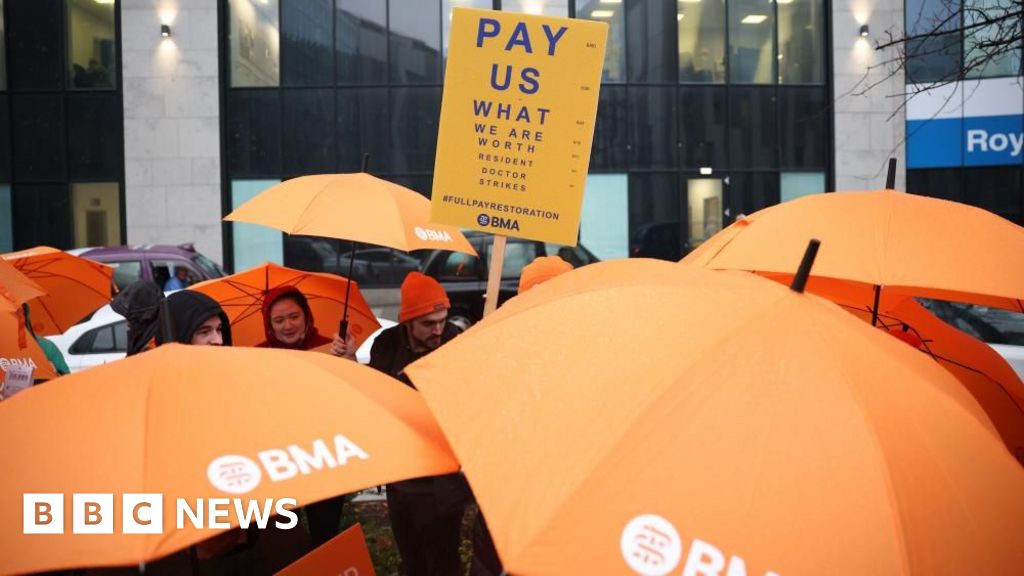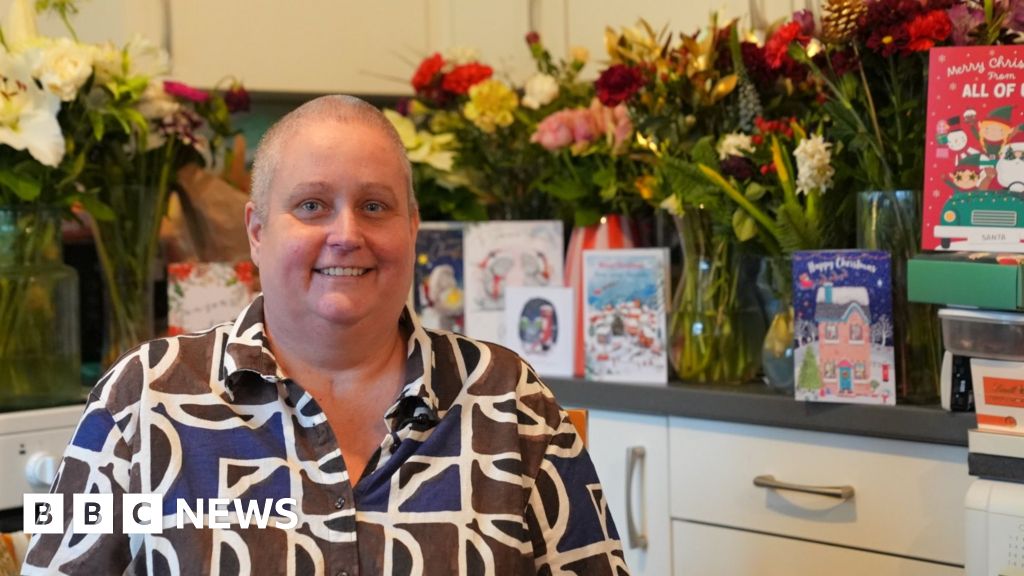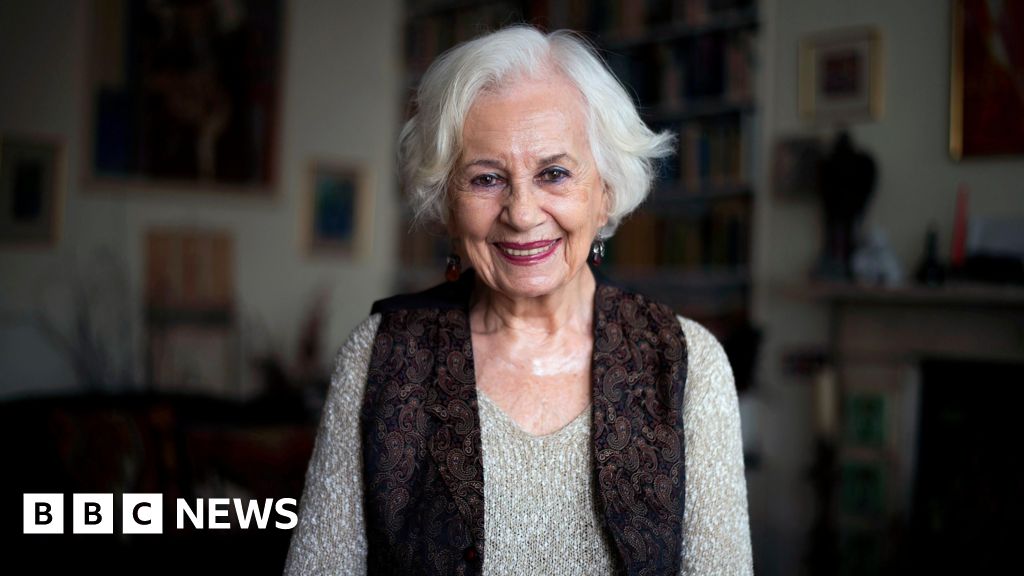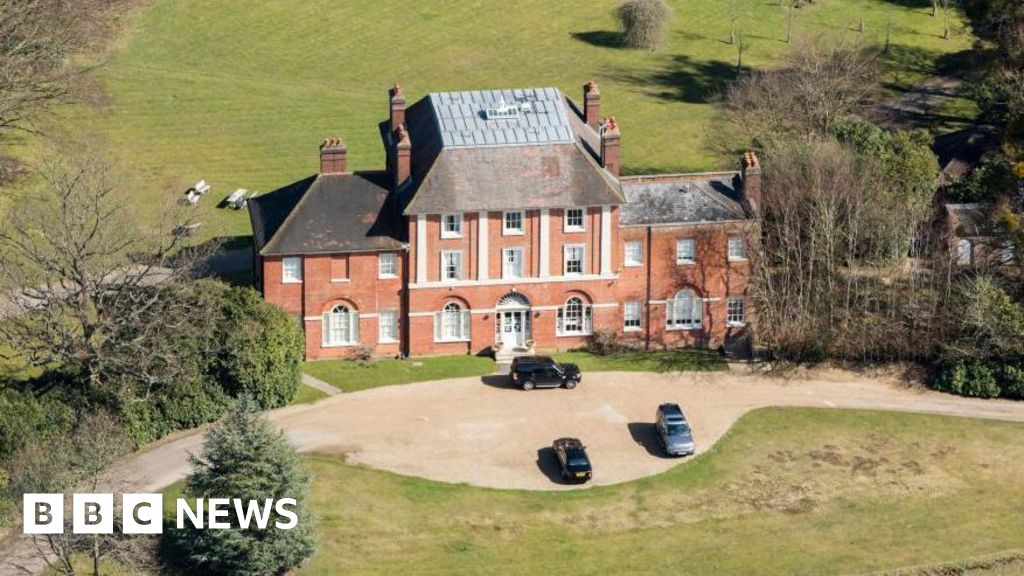Ed Thomas & Rebecca WearnBBC News

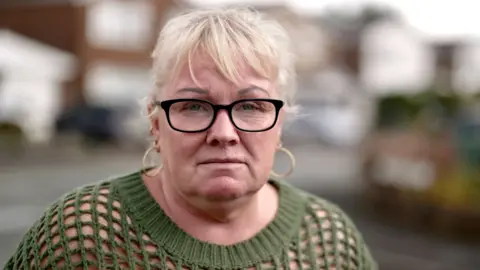 BBC
BBC
"It was really peaceful, there was no racism," says Mandy who attended a protest outside an asylum hotel
"I'm angry. My son can't get a house, but they're housing these first. It's not right, this is our country," says Mandy, as she stares at the Holiday Inn on the edge of Warrington that is now being used as an asylum hotel.
Mandy lives in a street across from the hotel, and is one of dozens of locals who have joined weekly peaceful protests to get the hotel shut.
A short drive up the M6, there are different concerns in Wigan, a town without any asylum hotels but 900 homes in multiple occupation - HMOs - some of which now house asylum seekers.
"I've had intimidation, confrontations in the street, illegal working," says local Adrian, anxiously pointing to several redbrick terraced homes in his neighbourhood that he says are such homes. One is next door to his.
"I was never asked. My voice has never been heard," he says in frustration.
Hundreds of people have got in touch with Your Voice Your BBC News about the issue of small boat crossings, illegal immigration and asylum-seeker accommodation.
As pressure builds on the government to speed up its plans to close asylum hotels, there are concerns that it will increase its use of HMOs - rental homes for unrelated groups of people sharing facilities - which could provoke another backlash.
"Be careful what you wish for," said one woman we spoke to in Wigan - a warning to the people protesting 200 miles away in Epping, Essex, for the closure of the Bell Hotel.


Mandy has been protesting outside the hotel in Warrington alongside other locals
The decision to close all asylum hotels will mean the situation will go from "bad to worse", says Faraz Baber from planning consultancy Lanpro, with demand for properties that can be turned into HMOs creating "even further tensions on an already inflamed issue".
While Josh Nicholson, from the Centre for Social Justice think tank, describes "a race to the bottom" as the Home Office and local authorities compete for accommodation. Most deprived areas with the cheapest housing and biggest profits for landlords, he argues, have already taken on an unfair burden of high numbers of HMOs.
In the first quarter of this year, just over 32,000 asylum seekers were in hotels across the UK. Another 66,000 were housed in taxpayer-funded "dispersal" accommodation - which includes HMOs - according to analysis of Home Office figures by the Migration Observatory an independent research centre at University of Oxford.
On Sunday, Defence Secretary John Healey said the government was looking at expanding the use of "military and non-military sites for potential temporary accommodation".
So, if all the asylum hotels close, what happens next?

 Getty Images
Getty Images
Protests started earlier in the summer in Epping, with people angry at asylum seekers being housed in the Bell Hotel
On the streets of north-west England, we have spoken to dozens of residents about their current concerns and what the future might hold for them. We also met asylum seekers living in one HMO, who told us they were thankful for their home and new life.
In Warrington, Mandy flicks through videos she filmed on her phone at one of the protests. "It was really peaceful, there was no racism, there were children there," she says, smiling as she points out a woman dressed up as the mythical figure, Britannia.
She is motivated to protest because the asylum-seeker hotel makes her feel unsafe, she says. Then she talks about questions of fairness.
"I've recently lost my husband and I couldn't get any help whatsoever." She believes the country is being taken for a ride.
Many here told us they were never warned or consulted about the hotel becoming asylum-seeker accommodation in the summer of 2023. Warrington Borough Council does not deny this, but says it is the Home Office that makes the decision on the use of a hotel, not the local authority.
There are 240 asylum seekers housed in two hotels in the town currently.
"They [asylum seekers] have been stood there in gangs staring into my house when I've been home alone, with my young daughter," says another local resident, Mary, who no longer feels safe.
"It's been absolutely awful for me. They would stop me in the street, follow me down the road, stop me by the arm. My daughter and a young friend were getting wolf-whistled at."


We spoke to Mary through her smart doorbell
But not everyone feels the same about the protests that have been held here. One woman tells us she worries they could turn violent, while another local, Lee, asks: "Whatever happened to English values of decency and justice?"
He believes the small boats should be stopped - but doesn't support the protests.
"Just by intimidating a load of people in a hotel on the weekend isn't doing anything is it? As far as I can see, by my own interactions with the people in that hotel over the road, they've been nothing but polite."
But the challenge of where to house people if the hotel was to close, poses its own complicated set of problems.
Not far away, in a village outside of Warrington, a former pub has been vandalised, the words "no HMOs" have been spray-painted all over - along with offensive language.
Watch: Pub on the edge of Warrington vandalised after rumours it could house asylum seekers
The vandalism followed speculation and rumours - but Warrington Borough Council told us no planning application for change of use had yet been lodged for it to be turned into an HMO.
The council says it is considering tightening its HMO rules and responding to issues raised by people in the community. It is also working with partners to make sure people seeking asylum have their needs met, it adds.
Most days, Lisa walks her two dogs past the pub, and says she wouldn't be happy if it became asylum accommodation. She would welcome women and children refugees, she says, but they are not the people she sees on the news.
"It's single men on small boats. What are their intentions?" she asks.
"I've never really been frightened living in my own country, but I am now. It's scary."

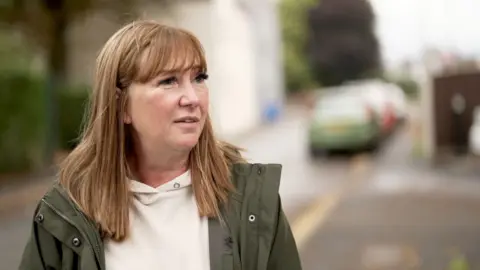
Lisa told us she was hopes the local pub is not turned into an asylum HMO
In north-west England, in June 2025, there were more than 16,800 asylum seekers in dispersal accommodation, such as HMOs. The Home Office asylum contract for the region is held by Serco - one of whose roles is to procure accommodation to satisfy demand.
One town that has already taken action to control the number of houses in multiple occupation is Wigan - 10 miles north of Warrington.
It has seen about a 160% rise in such accommodation since 2021 - and there are now more than 900 HMOs, with many housing groups of asylum seekers.
"That's a HMO, and that's a HMO… down the street is another HMO," explains local resident Adrian in a street of redbrick terraces. His list goes on.
For the past five years, he says he has been living next door to one such property housing asylum seekers.
"I've had intimidation, confrontations in the street," he tells us - showing photos he took of young men dressed as delivery drivers coming in and out the house.
Asylum seekers generally cannot work in the UK while their claim is being processed.

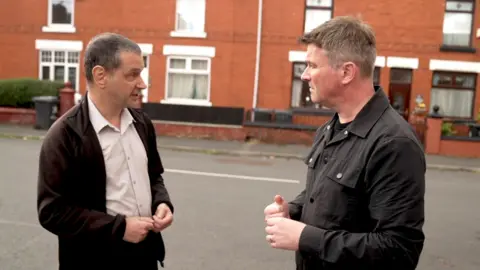
Adrian (left) speaks to Ed Thomas, he says there are several Asylum seeker HMOs in his street
"I've been made to feel like I'm the problem," he says. "We were never asked, never consulted. They [Serco] just moved them in at 2pm one afternoon. The only reason I knew about it was the voices, screaming and shouting next door."
Serco told the BBC that it is not responsible for the behaviour in the community and that this would be a police or Home Office issue.
We also spoke to two of Adrian's neighbours who said they didn't have a problem with people seeking asylum living close by, however one said they were frustrated the property owner hadn't consulted people in the street before signing a contract to let Serco take the house over.
Just Eat and Uber Eats told us they have introduced several measures to tackle illegal working on their platforms and to verify the identity of couriers.

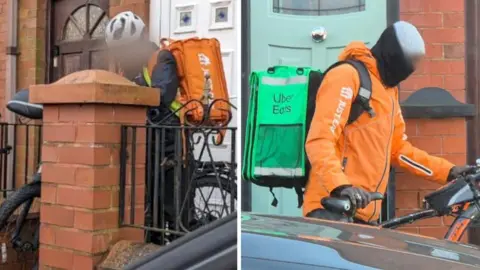
Adrian showed us photos he took of Just Eat and Uber Eats cyclists leaving an HMO
Wigan Council told the BBC that since 2023, it is one of the few towns in the UK to have an agreement with the Home Office that government contractors will not procure any more properties for asylum seekers in the town.
It said it recognised that housing asylum seekers placed a burden on its resources and that an over-concentration of Serco-run HMOs can have a negative impact on communities. But it added that HMOs are not just accommodation for asylum seekers and they play a role in creating lower-cost housing for people living on their own.
There were 1,193 asylum seekers receiving accommodation support in Wigan at the end of March 2025, according to Home Office figures analysis by the Migration Observatory. This represents 35 asylum seekers per 10,000 people in the local community.
The UK average in June was 15 per 10,000 people according to a House of Commons Library Asylum statistics report. The figure for north-west England was 27 per 10,000.
"The government seems to think that asylum hotels are the problem," says Josh Nicholson a senior researcher from the Centre for Social Justice. But he says that polling suggests greater use of HMOs, and ignoring local community concerns "will exacerbate people's feelings of being ignored and having a lack of agency".
If the shift is from hotels to HMOs, then planning consultant Faraz Baber has other concerns. It could encourage landlords to "get genuine family renters to leave their properties" so they can take on better-paid long-term deals with Home Office contractors.
According to the homeless charity, Shelter, Wigan has 11,500 households on the social-housing waiting list and Warrington has 7,600.
In its statement to the BBC, Wigan Council acknowledged there had been "real concerns about rising levels of HMOs in the borough, predominantly driven by private landlords converting properties to maximise rental income".


Two asylum seekers in Wigan told us they preferred living in a house to a hotel
As we knocked on doors in Wigan, we met two asylum seekers who are living in an HMO - a home that once housed a local family.
The men, an Iraqi Kurd whose asylum application is under appeal, and another from Afghanistan, both didn't want to be identified for safety reasons. The Afghan says he fled his country because a family member had fought for the Afghan army against the Taliban.

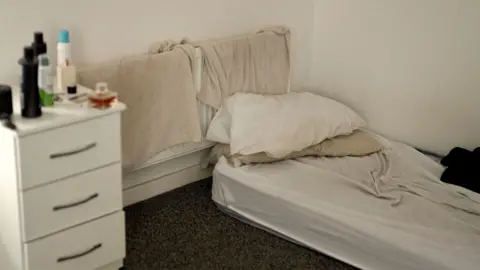
The asylum HMO had four bedrooms, plus a shared living room, kitchen and bathroom
The three-bedroom terrace has been converted to a four-bedroom HMO. Each bedroom can be locked, with a shared kitchen and bathroom. The two men showed us their bedrooms, living room and kitchen - all were clean and basic, painted white.
They told us they receive about £50-a-week to cover living costs, like food. The money is stored on a Home Office-issued debit card. The men said their utility bills were paid for and they had registered with a local dentist and GP.
With the help of a translator, we asked them about how they feel about the current tensions in the country and the asylum hotel protests.
"I find it strange that people come to protest. Those who come here are people whose lives are in danger or who face serious difficulties," the Iraqi Kurd told us.
The men had both been in asylum hotels - but said they preferred where they lived now. They liked to keep fit, they said. "We want to help everyone, to serve everyone, and we will work hard and contribute positively to this country," the Iraqi Kurd added.
When asked how they felt about some asylum seekers working illegally - and others who had been arrested for crimes, including attacks on women - the Iraqi Kurd shook his head and admitted he had heard some of the stories.
"A person can have toxic behaviour and forget themselves," he told us. "Anyone who understands the law would not behave like this. And if they do, they will face the consequences, because it is a crime in this country."

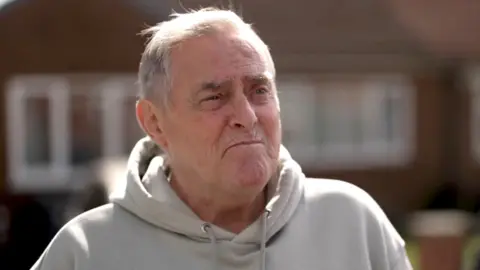
Barry is worried asylum hotel protests are being exploited by extreme-right groups
For some here, though, the freeze on HMOs in Wigan has come too late.
Barry contacted us through Your Voice Your BBC News. He is in his 70s now, but says he once played professional football for Wigan Athletic.
"It feels like our country has been taken away," he says.
He wants the small boats to be stopped urgently and illegal immigrants deported. He worries that the asylum hotel protests nationally are being exploited by extreme right groups.
The new Home Secretary, Shabana Mahmood - in the job less than a week - has said the small boat crossings are "utterly unacceptable and the vile people smugglers behind them are wreaking havoc on our borders". Protecting UK borders is her priority, she added, and she will explore all options to restore order to the immigration system.
Last week, Reform UK leader Nigel Farage told his party's conference that if elected he would stop migrants arriving on small boats within two weeks of entering government. But when asked about the length of time it would take to pass such laws, Farage said a government led by him would "want to do it as quickly as we possibly can".
At the end of August, the Conservative leader Kemi Badenoch said Prime Minister Sir Keir Starmer "puts the rights of illegal immigrants above the rights of the British people".
In response to our findings in Warrington and Wigan, the government said it had inherited an asylum system in chaos, with tens of thousands of individuals stuck in hotels waiting for their claims to be heard.
It had taken urgent action, it said, "doubling the rate of asylum decision-making, and reducing the amount of money spent on asylum hotels by almost a billion pounds in the last financial year".
The security of local communities within which hotels are located are its first priority, it added.
Additional reporting Patrick Clahane, James Percy, Bobbi Huyton, photos by Steve Fildes



 3 months ago
71
3 months ago
71


